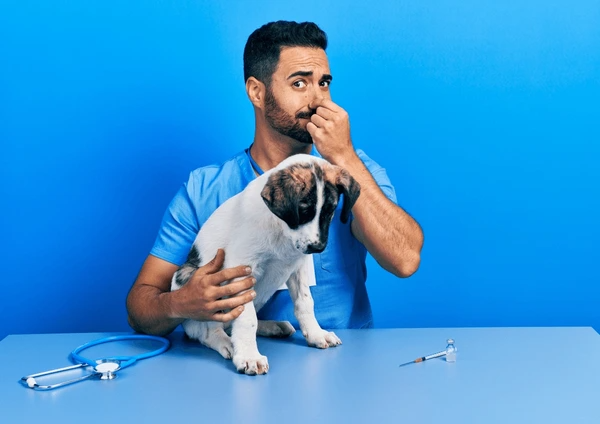Image Credit: Shutterstock
Have you ever noticed an unpleasant fishy smell coming from your female dog? It’s something no dog owner wants to experience, but it’s more common than you might think. The odor can linger, making your home less pleasant, and leaving you worried about your furry friend’s health. So, what causes this smell, and more importantly, How to get rid of fishy smell from female dog quickly and effectively?
What Causes the Fishy Smell in Female Dogs?
The fishy odor you smell is often linked to the anal glands in your dog. These small sacs are located near your dog’s rectum and release a secretion that can sometimes produce a strong fishy smell. This scent is natural, but it becomes problematic when the glands become impacted, infected, or overactive.
Female dogs, especially those who aren’t spayed, can sometimes develop stronger odors due to hormonal fluctuations. Additionally, urinary tract infections (UTIs) or skin infections can also cause a fishy odor.
Common Symptoms of Fishy Odor in Female Dogs
The smell isn’t the only clue that something is wrong. There are several symptoms you can look out for to determine if your dog’s odor requires attention:
- Scooting: Your dog might drag her bottom across the floor, which is a common sign of anal gland issues.
- Excessive Licking: Licking of the genital area or rear end can signal discomfort or infection.
- Swelling or Redness: If you notice inflammation around your dog’s anus, it may be a sign of infection.
These signs, combined with the odor, often indicate that your dog needs some care to resolve the issue.
Hygiene Tips to Prevent Odor
Prevention is always better than cure. Keeping your dog clean is one of the easiest ways to avoid the fishy smell. Regular baths, particularly focusing on the areas around her genitals and anus, are key.
Make sure to:
- Trim Fur: Keep the fur around the genital area trimmed to prevent dirt and bacteria buildup.
- Wipe Down: Use dog-safe wipes to clean your dog’s bottom after walks or bathroom breaks.
These small steps can go a long way in preventing odors before they become an issue.
How to Clean Your Dog’s Anal Glands at Home
If you’re comfortable, you can clean your dog’s anal glands at home. However, it’s not for everyone. If you’re squeamish, don’t worry—your vet can handle it for you.
Here’s a basic guide to express your dog’s anal glands:
- Wear gloves: Always use gloves to maintain hygiene.
- Locate the glands: The anal glands are located at about 4 o’clock and 8 o’clock around the anus.
- Gently press: Apply gentle pressure to the glands using a tissue or cloth to catch the secretion.
- Clean the area: Once done, wipe your dog’s bottom with a clean cloth.
It’s a delicate process, so if you’re unsure, consulting a vet is always the best option.
Dietary Changes to Eliminate the Smell
Your dog’s diet plays a crucial role in controlling odors. High-quality food that’s rich in fiber can promote healthy digestion and prevent anal gland issues.
- Add fiber-rich foods like pumpkin or sweet potatoes to your dog’s diet.
- Consider probiotics: Probiotic supplements can support gut health, which in turn helps maintain anal gland health.
A balanced diet will not only help your dog smell better but will also improve her overall health.
When to Visit the Vet
While you can try some home remedies, there are times when a vet visit is necessary. If your dog’s fishy smell persists despite your efforts, it could be a sign of a deeper issue.
- Chronic anal gland issues: If the glands are constantly impacted, they may need to be surgically expressed.
- Infections: A UTI or skin infection needs professional treatment.
- Behavior changes: If your dog seems lethargic, stops eating, or shows signs of pain, consult your vet immediately.
Also Read: How to Stop Discord from Opening on Startup
Natural Remedies for Odor Control
If you prefer to keep things natural, there are some great remedies you can try to combat your dog’s odor:
- Apple Cider Vinegar: Dilute with water and use as a rinse after bathing to neutralize odors.
- Coconut Oil: Applied to the skin, it can help reduce bacteria and soothe irritation.
Always be cautious when using natural remedies, and ensure they are safe for dogs before applying them.
Dog-Safe Cleaning Products
Not all cleaning products are safe for dogs, so it’s essential to choose ones specifically designed for pets. Look for:
- pH-balanced shampoos for dogs.
- Unscented wipes designed for pets to avoid irritation.
Avoid using strong perfumes or human products, as these can irritate your dog’s skin and worsen the smell.
How to Properly Bathe Your Female Dog
A proper bath can help reduce odors significantly. Follow these steps for a thorough clean:
- Brush before bathing: Remove loose fur and mats to help the shampoo penetrate better.
- Use lukewarm water: Hot water can irritate your dog’s skin, so opt for a comfortable temperature.
- Focus on problem areas: Pay extra attention to the anal and genital areas.
- Rinse thoroughly: Ensure all shampoo is rinsed out to prevent skin irritation.
Bathing your dog once a month is generally enough, but you can bathe more frequently if necessary.
Long-Term Odor Prevention
Consistency is key when it comes to preventing future odors. Here are some tips to keep your dog smelling fresh long-term:
- Regular vet checkups: Prevent health issues by staying on top of routine vet visits.
- Maintain a healthy diet: Keep your dog’s digestive system in check with proper nutrition.
- Groom regularly: Regular grooming prevents bacteria buildup and helps keep your dog clean.
Why Diet Matters in Odor Control
What your dog eats directly impacts her health, including how she smells. Low-quality foods can lead to digestive problems and contribute to the fishy odor.
- Choose high-protein, low-carb diets to promote better digestion.
- Avoid fillers: Grains and low-quality fillers can lead to inflammation, which might contribute to odor issues.
By feeding your dog a healthy, balanced diet, you’ll help maintain her overall wellness and reduce unwanted smells.
Also Read: How to Stop Discord from Opening on Startup
Conclusion
Dealing with a fishy smell from your female dog can be frustrating, but it’s manageable with the right approach. Understanding the causes and taking proactive steps, like maintaining good hygiene, adjusting her diet, and monitoring for health issues, will go a long way in keeping your dog smelling fresh. Remember, when in doubt, always consult with your vet to ensure your dog’s health is in top shape.
FAQs
1. Why does my female dog smell fishy?
The fishy smell usually comes from your dog’s anal glands. They may be impacted, overactive, or infected.
2. How often should I express my dog’s anal glands?
Some dogs may need their glands expressed every few months, while others may never need it. A vet can help guide you based on your dog’s needs.
3. Can a change in diet help with the smell?
Yes! A diet high in fiber and probiotics can promote healthy digestion and reduce the likelihood of gland issues.
4. Are there any home remedies for reducing the fishy odor?
Yes, natural remedies like apple cider vinegar and coconut oil can help, but it’s best to consult your vet before trying them.
5. When should I take my dog to the vet for a fishy smell?
If the smell persists despite home care, or if your dog is showing signs of discomfort, it’s time




